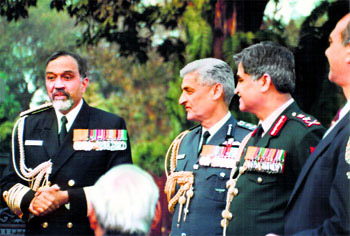INDIAN ARMED FORCES CHIEFS ON
OUR RELENTLESS AND FOCUSED PUBLISHING EFFORTS

SP Guide Publications puts forth a well compiled articulation of issues, pursuits and accomplishments of the Indian Army, over the years

I am confident that SP Guide Publications would continue to inform, inspire and influence.

My compliments to SP Guide Publications for informative and credible reportage on contemporary aerospace issues over the past six decades.
- Prime Minister witnesses 'Bharat Shakti' – a Tri-Services Firing and Manoeuvre Exercise in Pokhran, Rajasthan
- Interim Defence Budget 2024-25 — An Analysis
- Union Defence budget 2024
- Prime Minister Modi Commemorates Indian Navy Day in a Grand Ceremony
- Prime Minister Modi Flies in the LCA Tejas
- New Chapter in India-Italy Defence Ties
- Airpower beyond Boundaries
Admiral Sushil Kumar, Navy Chief during the Kargil War, passes away
India faced multiple military challenges during his eventful tenure from 1998 to 2001

Admiral Sushil Kumar, who took over as the 16th Chief of the Indian Navy in dramatic circumstances after the acrimonious sack of Admiral Vishnu Bhagwat by the Vajpayee Government on December 30, 1998, passed away at the Army's Research and Referral Hospital in New Delhi on November 27.
Admiral Kumar had an eventful tenure during which he supervised a massive naval mobilisation against Pakistan during the Kargil War in 1999. India's naval build-up was widely seen as having contributed to pressuring Pakistan to back down in the Kargil War.
His tenure was also marked by heightened operational readiness following the hijack of an Indian Airlines flight IC-814 by Pakistani terrorists from Kathmandu to Kandahar later in 1999. During the last fortnight of his eventful tenure, the Admiral also oversaw the naval mobilisation as part of Operation Parakram in response to the terrorist attack on the Indian Parliament on December 13, 2001. His three-year tenure ended on December 29, 2001, and he was succeeded by Admiral Madhvendra Singh.
India's naval build-up was widely seen as having contributed to pressuring Pakistan to back down in the Kargil War. His tenure was also marked by heightened operational readiness following the hijack of an Indian Airlines flight IC-814 by Pakistani terrorists from Kathmandu to Kandahar later in 1999. During the last fortnight of his eventful tenure, the Admiral also oversaw the naval mobilisation as part of Operation Parakram in response to the terrorist attack on the Indian Parliament on December 13, 2001
Admiral Sushil Kumar's last public appearance was in June this year for the launch of his book on Prime Minister Atal Bihari Vajpyee, 'A Prime Minister to Remember - Memories of a Military Chief'.
He was decorated for gallantry for his role in Operation Cactus in 1988 through which India restored the Government of the Maldives after its overthrow by an armed Sri Lankan group. He was then commanding the INS Ghorpad, an amphibious warfare ship. He was also awarded the Uttam Yudh Seva Medal for his role as Director of Naval Operations during Operation Pawan, India's peacekeeping intervention in Sri Lanka.
Admiral Sushil Kumar also took part in operations for the Liberation of Goa in 1961 and the 1971 India-Pakistan War.
His appointments included command of the naval forces in the Maharashtra and Gujarat Area, Andaman and Nicobar Islands and the Southern Naval Command. He also served as the Vice-Chief of Naval Staff.





